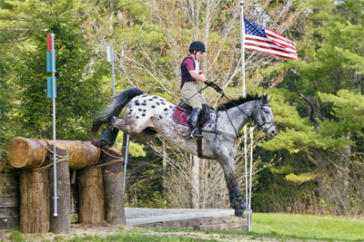Catholic Scholar Available to Discuss Legacy of NH Bishop McCormack, Challenges Faced by His Successor

The cross country phase of an event tests the bravery, stamina and skill of horse and rider. The UNH equine program will host its 40th annual United States Eventing Association Horse Trials fall event in October 1-2, 2011.
DURHAM, N.H. - Michele Dillon, a scholar of Catholicism and professor of sociology at the University of New Hampshire, is available to discuss the legacy of New Hampshire Bishop John McCormack and the challenges his successor will face with New Hampshire's 300,000 Catholics.
The Vatican has named the Rev. Peter Anthony Libasci to succeed Bishop John McCormack as the 10th bishop of the Diocese of Manchester. Libasci, 59, most recently served as auxiliary bishop of the Diocese of Rockville Center in New York. McCormack has served as the head of New Hampshire's Catholic Church since 1998. Prior to coming to New Hampshire, he was a top aide to Cardinal Bernard Law in the Archdiocese of Boston.
"Bishop McCormack has managed to steer the diocese through a great deal of upheaval and to maintain the relevance of the church during a time of significant social and economic change. His pastoral legacy in New Hampshire will be tainted somewhat by the church's sex abuse scandals, but in many respects, most Catholics seem to have moved beyond the scandal notwithstanding their continuing awareness of the great pain and anger that sex abuse and its cover-up have caused to many devout Catholics," Dillon said.
According to Dillon, McCormack's successor, Bishop Libasci, will confront many diverse challenges that will require imagination and commitment if they are to be remedied:
- Revitalizing the participation of Catholics in the church despite evidence in New Hampshire and across the United States of an increase in the numbers who prefer "no religion."
- Creatively responding to the pastoral, educational, and other needs of the growing numbers of families with young children who have moved in recent years to New Hampshire's urban centers.
- Finding the resources to enhance local churches' and Catholic Charities' strong efforts to help the poor across the diocese, in urban and rural communities alike, a challenge exacerbated during this time of protracted recession.
- Finding ways to knit together new parish communities formed in response to the closing or reconfiguration of local churches.
- Providing a strong, but not a polarizing, voice in the state's public political process that outlines the Catholic Church's views on various social justice issues and the need to serve the common good rather than vested interests.
Dillon has written extensively on Catholicism in the United States and elsewhere, and has been especially interested in the institutional and cultural processes that enable Catholics who selectively disagree with aspects of Catholic teaching to remain loyal to Catholicism. She also has examined the political engagement of the Catholic Church, and of other churches and activist organizations, in public moral debates in different western countries. She is the author of "Catholic Identity: Balancing Reason, Faith, and Power."
PHOTO
Michele Dillon, a scholar of Catholicism and professor of sociology at the University of New Hampshire.
/unhtoday/sites/default/files/newsroom/img/liberalarts/micheledillon.jpg.
The University of New Hampshire, founded in 1866, is a world-class public research university with the feel of a New England liberal arts college. A land, sea, and space-grant university, UNH is the state's flagship public institution, enrolling 12,200 undergraduate and 2,300 graduate students.
-30-
Latest News
-
July 2, 2024
-
June 18, 2024
-
June 18, 2024
-
May 17, 2024
-
May 14, 2024

















































